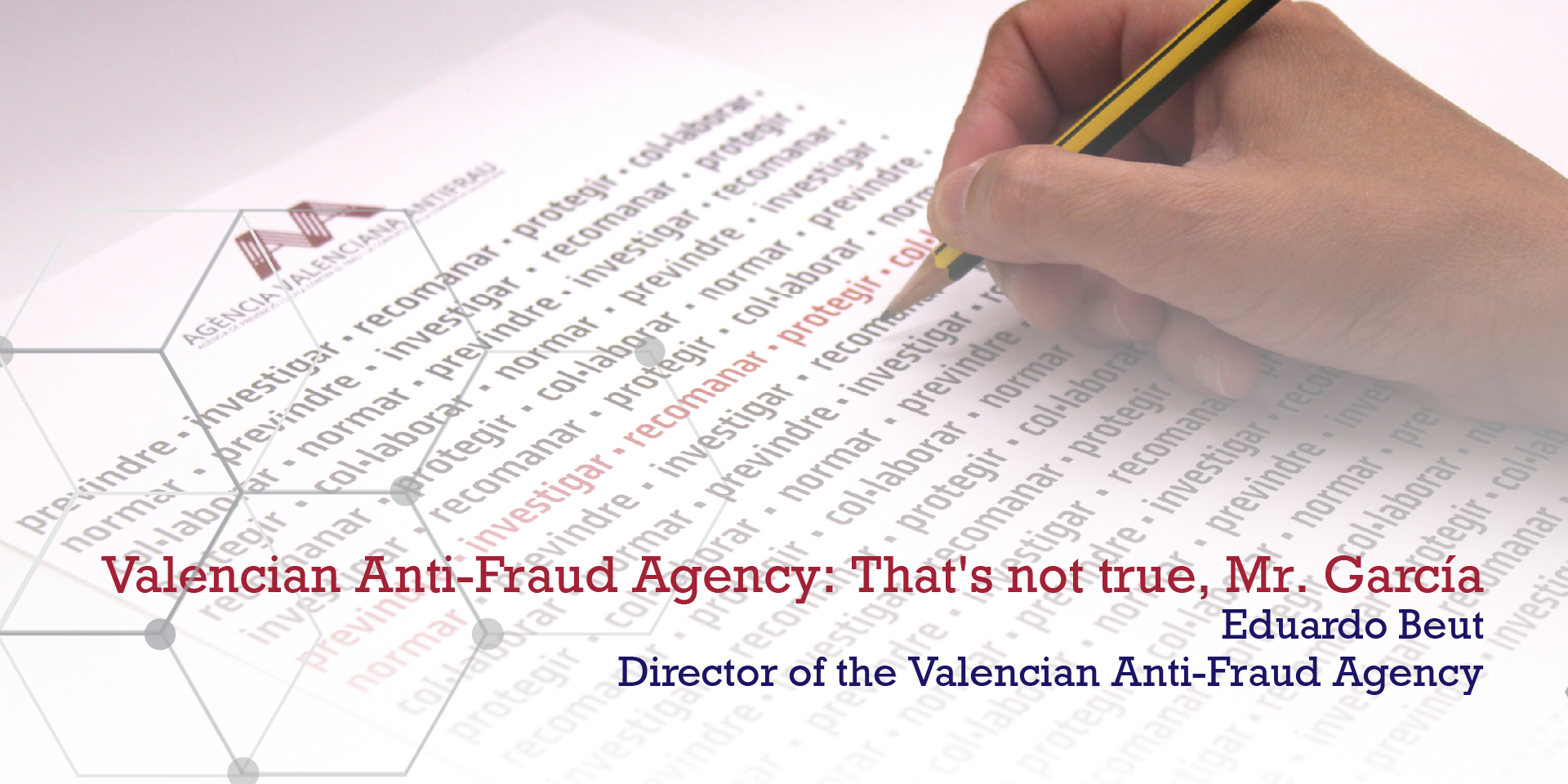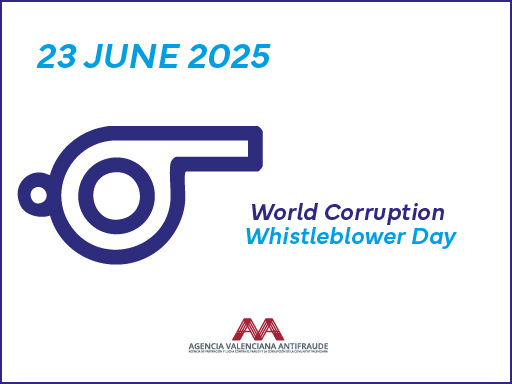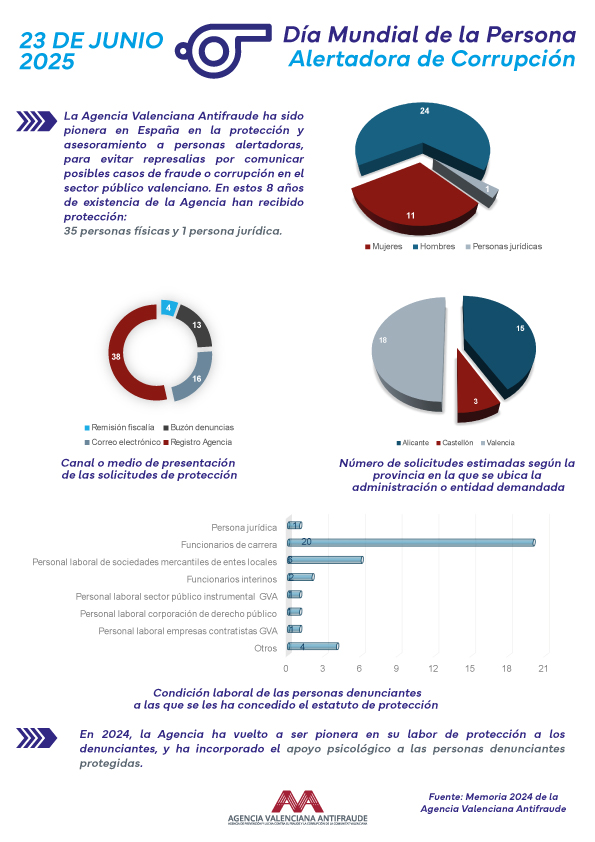After requesting on two occasions that the newspaper publish this opinion piece to exercise the right of reply to Mr. García’s statements about the Valencian Anti-Fraud Agency, and being denied, we are sharing the submitted article:
Valencian Anti-Fraud Agency: That’s Not True, Mr. García
In the era of post-truth, defending public integrity has become a risky endeavor. June 23, Whistleblower Protection Day, is an ideal occasion to remember that protecting those who report irregularities is not only an ethical imperative but also a cornerstone of the rule of law. However, beyond rhetorical statements, this date calls for an uncomfortable reflection: what happens when the very institutions created to uphold integrity become the target of smear campaigns fueled by half-truths and self-serving narratives?
The Valencian Anti-Fraud Agency (AVAF) is a paradigmatic case. In recent months, it has been subjected to a media and political attack which, under the guise of legitimate criticism, conceals a deliberate strategy of delegitimization. Accountability is part of the daily work of this agency’s civil servants, as it should be in any public organization.
It is alarming that a minor reform of the AVAF, recently approved by the Valencian Parliament (Les Corts), has been equated, as Mr. García does, with the suspension of the FCPA (Foreign Corrupt Practices Act) by the United States government. The confusion deepens when he mixes heterogeneous legal realities: conflating two legal regulations, a regulatory provision lacking sufficient legal support, and a code of ethics approved by the agency director’s resolution.
Let us therefore review some of the author’s claims:
He maintains that “the Citizen Participation Council, a vital channel between civil society and the Agency, has been eliminated.” However, the opinion issued by the Valencian Legal Advisory Council (CJC) on the AVAF’s internal regulations project was clear. It states:
“The Law 11/2016 creating the AVAF did not establish any participatory body whose structure, nature, functions, and composition should have been determined by the legislator. Thus, upon approving the regulation, Les Corts could have determined what type of bodies and entities should be represented in such a body and with what functions. Otherwise, as seen in Article 25 on its composition, it is the Agency itself —or, more precisely, its unipersonal leadership— which, by its sole will, decides how and by whom participation is exercised.”
Regarding its composition, the CJC adds:
“This way of regulating its composition —arbitrarily and invoking territorial and social representation criteria that are neither motivated nor objective— falls far short of a true model of participation.”
In plain language, the advisory body was elegantly warning of the disturbing possibility that the director was relying on biased or subjective selection criteria.
It is enough to observe the relationships between some of the organizations in the now-abolished Participation Council, their leaders and members, former Ethics Committee members, and former AVAF officials to verify the prescient accuracy of the statutory body’s opinion. The Valencian Parliament has recently taken a position, opting for a much more objective consultative model and avoiding participation by individuals whose only qualification is having held senior public office — meaning they were appointed directly by the government of the day, unlike the model followed by the new State-level Independent Whistleblower Protection Authority (A.A.I.).
It is claimed that this council was a vital channel. However, in practice, the participation of the association represented by the author has been non-existent. Its importance is insisted upon, but with regard to the previous code of ethics, only two organizations submitted contributions during the public consultation: AVACU (regarding the reception of gifts) and the citizen platform “Castelló per la Justícia i contra la Corrupció.” The pattern repeated itself with the new Code of Ethics recently approved: only the same citizen platform and Transparency International Spain submitted two comments. It is said to be an essential channel… but one that is absent in other regional anti-fraud agencies and, of course, the newly created national authority.
This brings us to the author’s next claim: that the new Code of Conduct “seriously lowers the previous standards of integrity and transparency.” To put this in context, it’s worth noting that two prestigious institutions —the Valencian Parliament (to which AVAF is accountable) and the Andalusian Anti-Fraud Office— are still in the process of developing their own codes.
But such a dramatic claim, coupled with accusations of “lowering institutional safeguards” and “gradually dismantling functions,” sounds striking yet is not supported by any facts. The reality is quite different: the AVAF still reports to the Valencian Parliament, not the government; it has not suffered any budget cuts; its powers remain unchanged; it continues to refer cases to the Public Prosecutor’s Office and has increased its operational activity.
The data —always stubborn— confirm this: the active workload when I took office was 659 cases, an inherited backlog that has since been reduced to 555 cases, despite 301 new complaints being received in 2025. As of July 23, 2024, the delay in handling complaints exceeded 15 months; now, those submitted in 2025 are being processed within legal timeframes. So far this year, four whistleblower protection requests have been made, one request for an extension of protection, and direct advice has been provided to nine individuals. Parliamentary groups have regularly requested information since July last year — 55 requests for case files have been received and addressed in due time. Most of these relate to the previous leadership period.
Mr. García, with all due respect, I must tell you that your statements are not accurate. I understand that you may be relying on what you have read or heard, and you are amplifying it without ill intent. But your professional background is in compliance, where unsubstantiated accusations should be contrasted with verifiable data and reliable sources.
Another repeated falsehood is the alleged loss of independence of the AVAF following the 2024 reform. On this point, it is useful to look at the official record — and the Spanish Official Gazette (BOE):
The new system for appointing the AVAF’s director —which involves two rounds of voting in the Valencian Parliament, requiring a three-fifths majority in the first and an absolute majority in the second— is not a product of political whim. It was actually proposed in 2022 by the previous leadership team, precisely to avoid parliamentary deadlock and to strengthen institutional stability. It is ironic that the very people who promoted this model are now its loudest critics. It should be noted that the same system is used by both the Catalan Anti-Fraud Office and the Andalusian Anti-Fraud Agency, institutions that have not faced criticism from those now expressing outrage in Valencia. What is presented as a democratic consensus and guarantee in other regions is falsely portrayed here as a threat to institutional independence.
This process is far more demanding than the one used for appointing the president of the State’s Independent Whistleblower Protection Authority (A.A.I.), who is directly appointed by the Council of Ministers, upon the proposal of the Minister of Justice, with the rank of undersecretary, and after a parliamentary committee hearing. So where, then, is the supposed superiority of the national model? Who does an undersecretary depend on?
Institutional independence is not just about how someone is appointed. It also involves structural guarantees —parliamentary oversight, budgetary autonomy, a specific legal framework— which the A.A.I. still lacks.
It is also relevant that the newly appointed president of the national authority is a founding member of Transparency International Spain, a former advisor to the “Hay Derecho” Foundation (both entities were part of the abolished Participation Council), and also served on AVAF’s Ethics Committee until the previous code of ethics was repealed — a decision made by the current signatory. It is always harder to attack a system that has chosen one of your own collaborators.
In short, the selective criticism of AVAF’s independence reveals more nostalgia for lost influence than genuine concern for institutional safeguards. Consistency —like a sense of humor— is rare but profoundly necessary.
I remain at your disposal for any assistance, suggestions, or recommendations from your association, which will always be appreciated and valued when aimed at preventing and fighting fraud and corruption.
Eduardo Beut
Director of the Agency for the Prevention and Fight Against Fraud and Corruption of the Valencian Community
Submitted to the media: June 25, 2025









